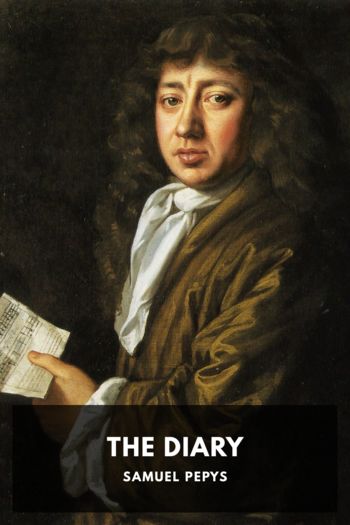The Diary, Samuel Pepys [e reader books TXT] 📗

- Author: Samuel Pepys
Book online «The Diary, Samuel Pepys [e reader books TXT] 📗». Author Samuel Pepys
Hon. Sidney Montagu assumed the name of Wortley, and was father of Edward Wortley Montagu (husband of Lady Mary Wortley Montagu). He died in 1727 (see note 1639). ↩
Thomas Pepys of London, next brother to Robert Pepys of Brampton, His two sons were Thomas and Charles. ↩
So of the Emperor Claudius:
“Dabitur mora parvula dum res
Nota urbi et populo contingat Principis aures.
Dedecus ille domus sciet ultimus.”
—M. B. ↩
A comedy, by Sir W. Davenant, licensed in January, 1633–34. ↩
Sir Heneage Finch, the Solicitor-General, was treasurer of the Inner Temple, and was selected as autumn reader, when he revived the splendid festivities which had long been discontinued. ↩
Dr. Thomas Fuller, who died on this day, was buried at Cranford, Middlesex, by his patron, Lord Berkeley. Dr. Hardy, Dean of Rochester, preached his funeral sermon. —Smyth’s Obituary, p. 54 ↩
Matthew Nicholas, LL.D., installed Dean of St. Paul’s, July, 1660. Died August 14th, 1661, and was buried at Winterbourn-Erles, Wilts. He was brother to Sir Edward Nicholas, Secretary of State. ↩
William, first Earl of Craven, eldest son of Sir William Craven, born 1606. Knighted by Charles I in 1627, and a few days later created Baron Craven of Hampstead Marshall, Berks. He was rich, and aided the king with money; but in 1649 his estates were confiscated. He recovered them at the Restoration, and in 1664 he was created Earl of Craven. High Steward of the University of Cambridge, 1667, and Master of the Trinity House, 1670–71. He was a devoted adherent of the Queen of Bohemia, and was supposed to be married to her, but there is no direct evidence of such marriage. He died April 9th, 1697. ↩
This “thing” was probably one of those large grants which Clarendon quietly, or, as he himself says, “without noise or scandal,” procured from the king. Besides lands and manors, Clarendon states at one time that the king gave him a “little billet into his hand, that contained a warrant of his own handwriting to Sir Stephen Fox to pay to the Chancellor the sum of £20,000 of which nobody could have notice.” In 1662 he received £5,000 out of the money voted to the king by the Parliament of Ireland, as he mentions in his vindication of himself against the impeachment of the Commons; and we shall see that Pepys, in February, 1664, names another sum of £20,000 given to the Chancellor to clear the mortgage upon Clarendon Park; and this last sum, it was believed, was paid from the money received from France by the sale of Dunkirk. —B. ↩
The Lord Privy Seal was John, Lord Robartes, and his house stood at the corner of Paradise Row and Robinson’s Lane. Lord Robartes was created Earl of Radnor in 1679, and one of the streets in the neighbourhood of his house is called Radnor Street. ↩
Houses at Chelsea situated on the low ground on the banks of the Thames. The church of St. Gabriel’s, Pimlico, marks the site. ↩
Alphonso, son of Robert Marsh, one of the musicians in ordinary to Charles I, baptized at St. Margaret’s, Westminster, January 28th, 1627. ↩
The child was christened Katherine, see post, September 3rd, 1661. ↩
Lady Jemima and Lady Paulina Montagu. ↩
Sir William Davenant introduced the use of scenery. The character of Hamlet was one of Betterton’s masterpieces. Downes tells us that he was taught by Davenant how the part was acted by Taylor of the Blackfriars, who was instructed by Shakespeare himself. ↩
A comedy, by Richard Brome, first acted at Salisbury Court, 1638, and published in 1640. ↩
This Three Cranes tavern was situated in the Poultry. There is a token of George Twine, dated 1665 (see Boyne’s Trade Tokens, ed. Williamson, vol. i, 1889, p. 704). ↩
The Jovial Crew, or the Merry Beggars, a comedy, by Richard Brome, first acted at the Cockpit, Drury Lane, in 1641. Published in 1652. ↩
Balthazar St. Michel, see note 199. ↩
The French comedians acted at the Cockpit. The Theatre Royal on the site of the present Drury Lane Theatre was not built till 1663. ↩
Lord John Somerset, second son of the first Marquis of Worcester, had himself three sons, Henry, Thomas, and Charles, but it is uncertain which is here meant. There was no other Lord Somerset to whom the passage could apply. It was probably Thomas, as the other brothers were married. —B. ↩
The young ladies’ governess. ↩
A voluntary contribution made by the subjects to their sovereign. Upon this occasion the clergy alone gave £33,743. See May 31st, 1661. —B. ↩
Lady Katherine Montagu, youngest daughter of Lord Sandwich, married, first, Nicholas Bacon, eldest son and heir of Sir Nicholas Bacon, K.B., of Shrubland Hall, co. Suffolk; and, secondly, the Rev. Balthazar Gardeman. She died January 15th, 1757, at ninety-six years, four months. —B. ↩
Apparently a servant of Mr. Somerset’s. —B. ↩
A comedy, by John Fletcher, acted at the Blackfriars. It was published first in 1637. ↩
Admiral Sir George Ayscue, knighted by Charles I, but appointed Admiral of the Fleet in the Irish Seas in 1649 “for his fidelity and good affection to the Parliament.” Vice-Admiral of the Blue Squadron under the Duke of York in the action with the Dutch fleet on June 3rd, 1665, and





Comments (0)